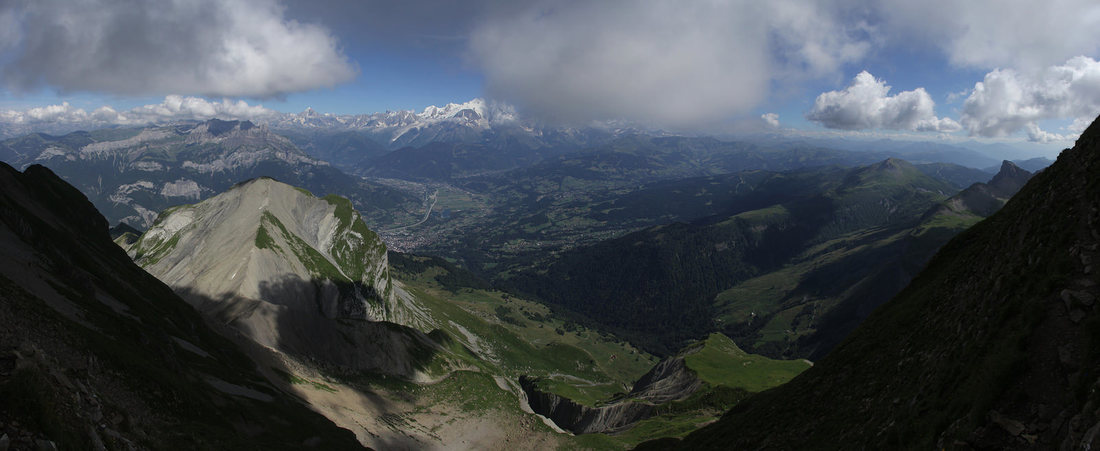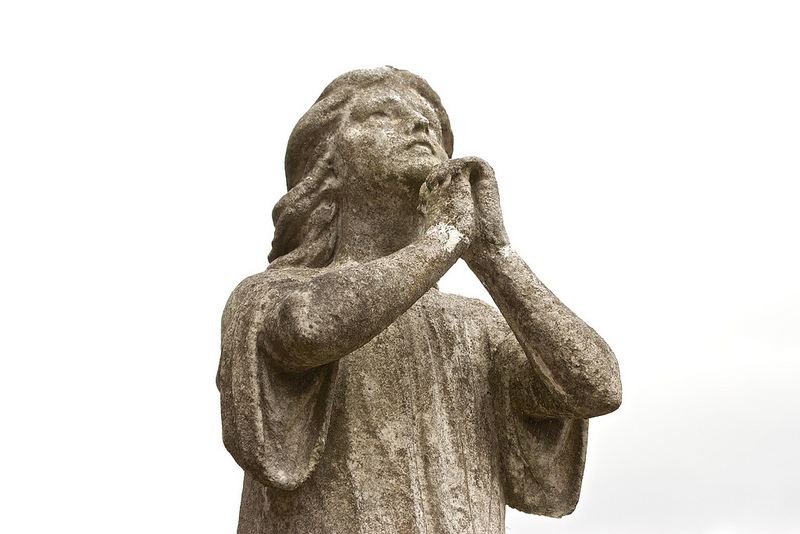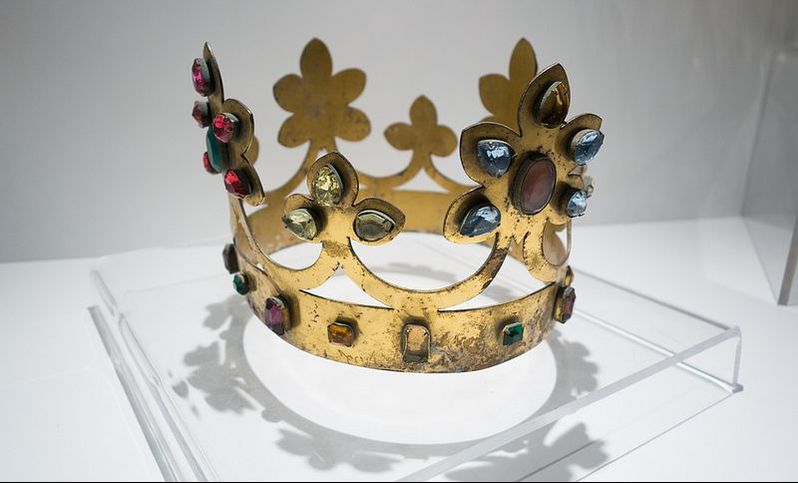|
We find the story of God testing Abraham in Genesis 22. Abraham was told to take his "only son, Isaac," to Mount Moriah where he was to sacrifice him as a burnt offering. (Verse 2) Being obedient, he did exactly what he was instructed to do and was about to slay Isaac when the Lord stopped him and provided a ram for the sacrifice. "So, Abraham called the place 'The Lord Will Provide.'" (Genesis 22:14) What played out in the Old Testament was a divine rehearsal for what was to come in the New Testament. The lamb, provided by God for Abraham, was caught by its horns in a thicket. Salvation or deliverance from death was given to Isaac through the lamb.
The lamb would become an animal of significance for the Hebrews. It was the blood of a lamb that saved the firstborn sons of the children of Israel when God passed through Egypt to strike down the first-born of men and animals. (Exodus 12:12) Every family needed a lamb and had to slaughter it to provide the blood to be placed at the top and sides of the door frame of their houses. The Israelites would be eating the Passover meal and preparing to leave Egypt as God was going to deliver them. As the children of Israel were moving toward the Promised Land God would set up a sacrificial system that would provide a way for them to approach Him. It was done through the sacrifice of a lamb and required that its blood be shed. This system allowed the lamb to take the place of a person to remove their sins and had to be done for them to approach a holy God. Celebrating the Lord's Passover also became a yearly festival and was to take place on the 14th of Nisan, the first month of each year on the Hebrew calendar. "Tell the whole community of Israel that on the 10th day of this month each man is to take a lamb for his family, one for each household...Take care of them until the 14th day of the month, when all the people of the community of Israel must slaughter them at twilight." (Exodus 12:3, 6) The sacrificial lambs in each of these scenarios pointed to another Passover Lamb—the Lamb of God—who is God's only Son. John the Baptist knew it when he saw Jesus coming toward him and said, "Look, the Lamb of God, who takes away the sins of the world!" (John 1:29) Jesus is our Passover Lamb and was slain so that we can live forever with Him. Isaiah prophesied what would happen to Jesus: "He was oppressed and afflicted, yet He did not open His mouth; He was led like a lamb to slaughter, and as a sheep before its shearers is silent, so He did not open His mouth." (Isaiah 53:7) Passover eve and Good Friday occur on the same day this week. Father God has made a perfect, spotless Lamb available to each of us. The blood of the Lamb of God was shed for our sins and the sins of the world. How should we respond? We must do as Abraham told his servants he would do: "We will worship and then we will come back to you." (Genesis 22:5) Let us make our worship sacrificial in nature and exalt the Lord for His indescribable gift. Jerusalem is surrounded by mountains. Its elevation is higher than the ground around it. When one visits Israel, they must literally go up to get to Jerusalem. Look at Psalm 122:3-4. "Jerusalem is built like a city that is closely compacted together. That is where the tribes go up, the tribes of the Lord, to praise the name of the Lord according to the statute given to Israel." The city is seen as a stronghold for the Lord's people in Psalm 125:1-2. "Those who trust in the Lord are like Mount Zion, which cannot be shaken but endures forever. As the mountains surround Jerusalem, so the Lord surrounds His people both now and forevermore."
There are 15 psalms (Psalm 120 - 134) that are called the "Songs of Ascents." Some believe that those psalms were sung by the Jews as they were going up to Jerusalem for the three required festivals. Psalm 121:1-2 gives us a good visual of what would have been going on. "I lift my eyes to the hills--Where does my strength come from? My help comes from the Lord, the Maker of heaven and earth." Regardless, it is not an accident that the holy city sits high and requires us to ascend. Going up to Jerusalem is a picture of what the Jewish people are meant to do physically and what the entire Believing community is meant to do spiritually. The Hebrew word ascending is "Alijah." Physically moving from one country to Israel is called "making Alijah," or "the upward journey." How do we see our lives in relation to the Lord? We are meant to pursue Him for our entire lives. Thus, we are on a journey, an upward journey, and it is one of a daily ascent. We have choices to make daily; we have paths to choose. Climbing higher toward the Lord is not easy. There are battles to fight on the journey of ascent. However, when we choose the high path it will bring us into a more intimate relationship with the Lord. Moses sent 12 men, one from each tribe of Israel, to explore the Promised Land. He said, "Go up through the Negev and on into the hill country." (Numbers 13:7) The children of Israel would have to move up to take the land that the Lord wanted to give to them. As we are obedient to go up, God will give us more ground. "See, the Lord your God has given you the land. Go up and take possession of it as the Lord, the God of your fathers, told you. Do not be afraid; do not be discouraged." (Deuteronomy 1:21) Moses told Caleb that he and his children would inherit the land on which his feet walked because he followed the Lord wholeheartedly. Caleb was not afraid to go up to the hill country and was rewarded for walking the challenging path up. He told Joshua, "Now give me this hill country that the Lord promised me that day. You yourself heard then that the Anakites were there and their cities were large and fortified, but the Lord helping me, I will drive them out just as He said." (Joshua 14:12) God has a unique spiritual Promised Land for each of us that requires us to persevere in taking the high road. Life is meant to be like a journey up a mountain--always ascending to draw closer to the Lord. We were made to ascend. This is confirmed in Habakkuk 3:19. “The Sovereign Lord is my strength; He makes my feet like the feet of a deer, He enables me to go on the heights." As Believers in Christ we are called to live a Kingdom life style. To the world, the way of the Kingdom of God looks upside down and crazy. We know that God speaks to us to guide us. The people of the world do not understand this. We also know that when God speaks He may ask us to do something that makes no sense. In living God's way, we must lay down our desires—our lives—to bring light into a dark world through sacrifice.
We are taught to pray, "Your Kingdom come, Your will be done on earth as it is in heaven." In her book, On Asking God Why, Elisabeth Elliot says, "If it is the Kingdom of Heaven you really want...you will be on your knees saying, 'Thy Kingdom come,’ which means 'My kingdom go.' You will be saying, 'Thy will be done,' which means 'My will be undone.'" As a dear friend of mine would say during her years as a missionary in Ethiopia, "I have daily opportunities to die to self." God gave me a practical example of this through the massive snow storm we had on Wednesday and one that we had a few years ago. I had to make a choice about how to respond to a situation that arose. God clearly spoke to me and gave me direction. I was reminded that I am a citizen of the Kingdom of God, not the kingdom of self. My home is in a condominium community with a parking area without designated parking spots. When it snows, each of us must clear and shovel out our own cars. Several years ago, a storm that dumped over a foot of wet, heavy snow on the ground presented a challenge. I spent over an hour removing snow so that I could move my car in and out and would not have to walk on mounds of freezing liquid in the days to come. When I came home from work on the following day I found that someone had parked in "my spot" which meant I had to park my car quite a distance from my front door in a pile of snow. My anger at the "spot stealer" grew as I suddenly realized that the “thief” was getting out of her car and that I could go to give her a "piece of my mind." I learned that the "thief" had lived in our community for many years and was a neighbor. She is a woman about my age; however, does not have the physical stamina that God has given to me. The Holy Spirit whispered to me: "Tell her to have a nice day, Joan." I responded: "What? Are you serious?" He confirmed: "Tell her to have a nice day." After telling my neighbor to have a nice day, I walked inside with steam pouring out of me. It took me a while to calm down and realize how foolish I had been. I had forgotten that my context is the Kingdom of God, not self. On Thursday morning I had the opportunity to demonstrate what I learned a few years ago. As I looked out my window at the snow-laden trees down to the parking lot, I saw my “spot stealing” neighbor struggling to free her car. She had scrapped the snow off the car onto the area next to it and now had almost two feet of snow to move. She was trying to stomp it down with her feet and remove it with her hands. The Holy Spirit quickened in me to get my shovel and help her. Together we cleaned up the area around her car until she could pull it out. I told her to have a nice day! The Holy Spirit spoke words of affirmation to me in a way that only I would understand--a unique and unorthodox way that brought tears to my eyes. I was reminded of Elisabeth Elliot's words: "In the Kingdom of God the alternatives are not boundless...You opted out of all that when you made up your mind to follow a Master who Himself had relinquished all rights, all equality with the Father, and His own will as well. You are called not to be served but to serve...You can't operate in two opposing kingdoms." Here is what Scripture tells us. "Small is the gate and narrow the road that leads to life, and only a few find it." (Matthew 7:14) We must remember that we are citizens of the Kingdom of Heaven and should live accordingly. Our goal is to glorify God which means obedience, sacrifice and death to self. The rewards of peace, friendship with God and life forever with Him are worth it! "Your mission, should you choose to accept it..." Every "Mission Impossible" TV show started with this statement and then went on to describe the mission. As I re-read the story of Esther in celebration of Purim (which occurred on Thursday and Friday) I thought about the difficulty of Esther's mission. She was asked to do two unthinkable tasks.
Because Esther's parents had died, she was adopted into the family of Mordecai. His family had been exiled from Jerusalem to Babylon along with many from Judah. They lived under the rule of King Xerxes who had banished his queen for refusing to obey him. He was in search of a new queen and decided to pull her from a group of beautiful, young virgins living in the kingdom. An agent of the king found Esther and brought her into the royal harem at Susa. Part 1 of the mission meant that Esther would have to lay down her life as she knew it. Her nationality and family background had to be hidden. She would be subjected to 12 months of beauty treatments; her sole purpose in life would be to please the king. She would lose her virginity and become the possession of King Xerxes, a man who was surely old enough to be her father or grandfather. What a sacrifice she made! With the help of God, she was able to please the king so much that he made her his queen. Part 2 of the mission was life threatening for Esther. King Xerxes promoted an Agagite named Haman to the position of prime minister. He gave him his signet ring, allowing him to make decisions and decrees. All the king's officials were required to bow down to Haman as he passed by. Because Mordecai refused to do this, he, along with every Jew who lived in Xerxes' empire, was targeted to be destroyed. Lots were cast (called Purim) to determine the time when the Jews were to be killed. The lot fell on the month of Adar, the twelfth month, about one year later. Sealed letters were sent to the leaders of each province that decreed that all Jews must be killed on one day. The decree was made known to all the people so that they could prepare to follow the decree on the appointed day. Can you imagine the horror felt by the Jewish people? Great mourning took place among the Jews. Mordecai sat in the courtyard in sackcloth and ashes. The Jews needed an advocate. Mordecai asked Esther to be this person even though he knew that anyone who appears before the king without an invitation is doomed to die unless the king holds out his gold scepter. (Esther 4:11) However, he also recognized that Esther might be the only one who could petition the king for mercy. Mordecai told her, "And who knows that you have come to royal position for such a time as this?" (Esther 4:14) God has a unique plan and purpose for every person on the face of the earth. Robert Henderson, in his book, Courts of Heaven, describes the interaction between the courts of heaven and the earthly realm. He explains that "in the counsel of the Lord decisions were made about destinies in the Earth...This all occurred before time began...God wrote in a book the decisions made that would be our Kingdom reason for existence on the planet." (Psalm 139:16) We must find our purposes. Then we have a choice: We can agree with God's desires or we can lay them aside. Henderson says that God grants us opportunities to fulfill His ultimate purpose for us. "When decisions in earth agree with the decisions in heaven powerful things occur." In addition, "When we find our purpose God gives us the grace to fulfill it.” Esther agreed to walk out her mission and was given the grace to fulfill it. The king extended his gold scepter to her. The Jews were delivered and saved, and their enemies killed. Yearly, the Jews celebrate what God did for them in the festival called Purim. God's desire is for all of us to fulfill His purposes. May we all delight in discovering them and living them out. This will be a cause for rejoicing in the earthly and heavenly realms. |
Joan E. MathiasCategories
All
Archives
July 2024
|




 RSS Feed
RSS Feed